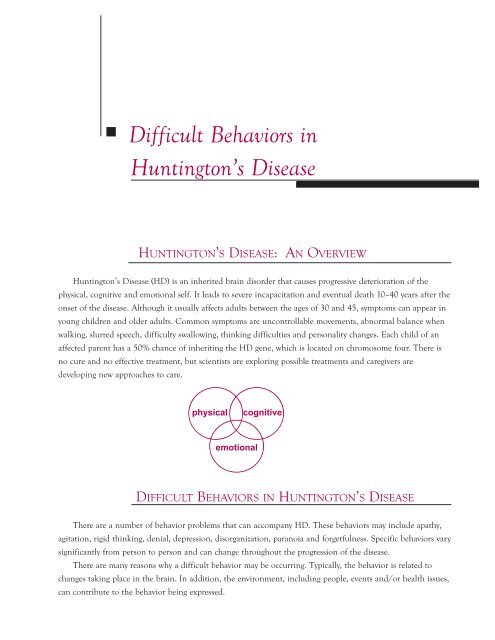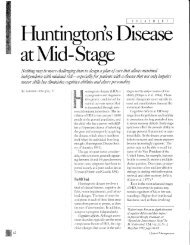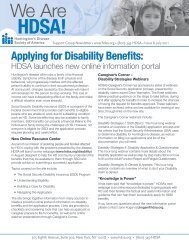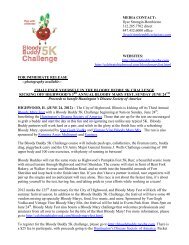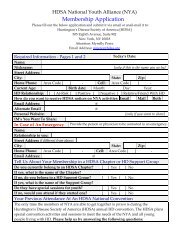Understanding Behavior in HD.final.8-18-05 - Huntington's Disease ...
Understanding Behavior in HD.final.8-18-05 - Huntington's Disease ...
Understanding Behavior in HD.final.8-18-05 - Huntington's Disease ...
Create successful ePaper yourself
Turn your PDF publications into a flip-book with our unique Google optimized e-Paper software.
Difficult <strong>Behavior</strong>s <strong>in</strong><br />
Hunt<strong>in</strong>gton’s <strong>Disease</strong><br />
HUNTINGTON’S DISEASE: AN OVERVIEW<br />
Hunt<strong>in</strong>gton’s <strong>Disease</strong> (<strong>HD</strong>) is an <strong>in</strong>herited bra<strong>in</strong> disorder that causes progressive deterioration of the<br />
physical, cognitive and emotional self. It leads to severe <strong>in</strong>capacitation and eventual death 10–40 years after the<br />
onset of the disease. Although it usually affects adults between the ages of 30 and 45, symptoms can appear <strong>in</strong><br />
young children and older adults. Common symptoms are uncontrollable movements, abnormal balance when<br />
walk<strong>in</strong>g, slurred speech, difficulty swallow<strong>in</strong>g, th<strong>in</strong>k<strong>in</strong>g difficulties and personality changes. Each child of an<br />
affected parent has a 50% chance of <strong>in</strong>herit<strong>in</strong>g the <strong>HD</strong> gene, which is located on chromosome four. There is<br />
no cure and no effective treatment, but scientists are explor<strong>in</strong>g possible treatments and caregivers are<br />
develop<strong>in</strong>g new approaches to care.<br />
physical<br />
cognitive<br />
emotional<br />
DIFFICULT BEHAVIORS IN HUNTINGTON’S DISEASE<br />
There are a number of behavior problems that can accompany <strong>HD</strong>. These behaviors may <strong>in</strong>clude apathy,<br />
agitation, rigid th<strong>in</strong>k<strong>in</strong>g, denial, depression, disorganization, paranoia and forgetfulness. Specific behaviors vary<br />
significantly from person to person and can change throughout the progression of the disease.<br />
There are many reasons why a difficult behavior may be occurr<strong>in</strong>g. Typically, the behavior is related to<br />
changes tak<strong>in</strong>g place <strong>in</strong> the bra<strong>in</strong>. In addition, the environment, <strong>in</strong>clud<strong>in</strong>g people, events and/or health issues,<br />
can contribute to the behavior be<strong>in</strong>g expressed.


